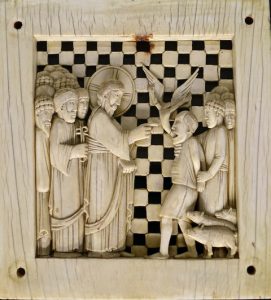HOMILY WEEKDAY 27 05 – Year I
In-breaking of the Kingdom of God
(Joel 1:13-2:2; Ps 9; Lk 11:15-26)
*******************************************
The readings today invite us to heed the word of God like Joel, to repent and change, to practice justice and fairness in our lives and all our affairs, to put our complete trust and confidence in Jesus, and to strive to live in the Kingdom of God.

Jesus heals a demoniac
The New Revised Standard Version of the bible informs us that Beelzebul was originally the title of the Canaanite storm and fertility god Baal. “The kingdom of God has come among you” reflects Jesus’ interpretation of his ministry. This statement registers the uncompromising demands of Jesus’ call to discipleship, and in relation to the preceding parable the saying declares that in the struggle between Jesus and Beelzebul, neutrality is not an option.
I would add we need to let God push out the unclean spirits from our hearts, minds and souls by filling us with the gifts of the Holy Spirit, rather than try to pull them out ourselves. This passage underlines the importance of hearing and keeping the Word of God, which is done best by repentance and inner purity.
The New Interpreters Bible tells us one way the opponents of Jesus tried to deal with the threat Jesus posed to the religious establishment was to discredit him by accusing him of deviancy. Jesus warns that the removal of evil is not the final solution, as the evil spirits may return; wholeness and light throughout the body are required as well.
Because the work of Jesus represents the vanquishing of Satan and the coming of light and wholeness, it is itself a sign that the kingdom of God is present in Jesus. Here Jesus is being tested as he was by Satan in the desert – the same verb is used. The religious leaders did not understand the meaning of the exorcisms, which represent a direct assault on Satan’s power. The exorcisms show Satan’s power has been broken and that at the same time God’s reign is being established.
Seen in the light of the simile of the Strong Man, the exorcisms confirm that two kings have clashed. Powerful as Satan is, God has defeated him, seized his armour and is plundering his possessions. In 9:50 Jesus said one who was not against him is for him; here he says one who is not for him is against him. One must choose sides – in the struggle to establish God’s claim over Satan, there can be no neutrality.
Regarding the return of the unclean spirit, because there is no middle ground, no room for neutrality, the person who has been delivered from the power of the unclean spirit must fill his or her life with the kingdom of God and obedience to the Word of God. The language of this parable echoes early Christian warnings about apostasy.
The world of recovery offers another take on this return of the unclean spirits. Some authorities teach the disease of addiction continues to progress even when a person is sober, and not active in the addiction. Thus, if and when there is a slip or relapse, that person can actually revert to a situation where they are worse off than when they stopped practicing the addiction. Thus, the warning of Jesus in the gospel that “the last state of that person is worse than the first.”
There is hope, however, in the event of relapse. If the addict accepts the humiliation of failure, learns at a deeper level the depth of his or her weakness, and uses that to make a final commitment to never do the addictive behaviour again, the relapse actually becomes therapeutic and beneficial.
To sum up, the readings today invite us to heed the word of God like Joel, to respond to the call to repentance and change, to practice justice and fairness in our lives and all our affairs, to put our complete trust and confidence in Jesus, and to strive to live in the Kingdom of God.
Celebrating the Eucharist brings all these teachings together. May our celebration lead us into personal transformation and a more profound experience of living in the Reign of God.



